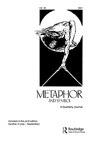The Embodiment of Power as Forward/Backward Movement in Chinese and English Speakers
IF 3.3
3区 文学
0 LANGUAGE & LINGUISTICS
引用次数: 8
Abstract
ABSTRACT In two experiments, we examined whether POWER is embodied in terms of horizontal forward and backward movement using an action compatibility task. Participants were asked to categorize power-related words (e.g., “boss”, “intern”) aseither “powerful” or “powerless” as quickly and accurately as possible. In the compatible condition, the response to indicate that the word was “powerful” involved a forward movement and the response to indicate “powerless” involved a backward movement. Under incompatible conditions, these responses were reversed (“powerful”-backward/“powerless”-forward). In both experiments, participants were faster to categorize the words when the response actions were compatible than incompatible. Furthermore, this compatibility effect was observed for both Chinese (Mandarin) speakers categorizing Chinese words and English speakers categorizing English words. These data suggest that the psychological reality of a “POWER IS MOVING FORWARD” conceptual metaphor in both language groups, which we argue is based on an extension of the “SOURCE-PATH-GOAL” schema.权力作为前进/后退运动在中英文语言中的体现
摘要在两个实验中,我们使用动作兼容性任务检验了POWER是否体现在水平向前和向后移动方面。参与者被要求尽可能快速准确地将与权力相关的单词(如“老板”、“实习生”)分为“强大”或“无力”。在相容条件下,表示单词“有力”的反应涉及向前运动,表示“无力”的反应则涉及向后运动。在不兼容的条件下,这些反应是相反的(“强大”-向后/“无力”-向前)。在这两个实验中,当反应动作兼容时,参与者对单词的分类比不兼容更快。此外,这种兼容性效应在汉语(普通话)使用者对汉语单词的分类和英语使用者对英语单词的分类中都得到了观察。这些数据表明,“权力正在向前发展”概念隐喻在两个语言组中的心理现实,我们认为这是基于“来源-途径-语言”模式的扩展。
本文章由计算机程序翻译,如有差异,请以英文原文为准。
求助全文
约1分钟内获得全文
求助全文
来源期刊

Metaphor and Symbol
Multiple-
CiteScore
2.90
自引率
0.00%
发文量
23
期刊介绍:
Metaphor and Symbol: A Quarterly Journal is an innovative, multidisciplinary journal dedicated to the study of metaphor and other figurative devices in language (e.g., metonymy, irony) and other expressive forms (e.g., gesture and bodily actions, artworks, music, multimodal media). The journal is interested in original, empirical, and theoretical research that incorporates psychological experimental studies, linguistic and corpus linguistic studies, cross-cultural/linguistic comparisons, computational modeling, philosophical analyzes, and literary/artistic interpretations. A common theme connecting published work in the journal is the examination of the interface of figurative language and expression with cognitive, bodily, and cultural experience; hence, the journal''s international editorial board is composed of scholars and experts in the fields of psychology, linguistics, philosophy, computer science, literature, and media studies.
 求助内容:
求助内容: 应助结果提醒方式:
应助结果提醒方式:


